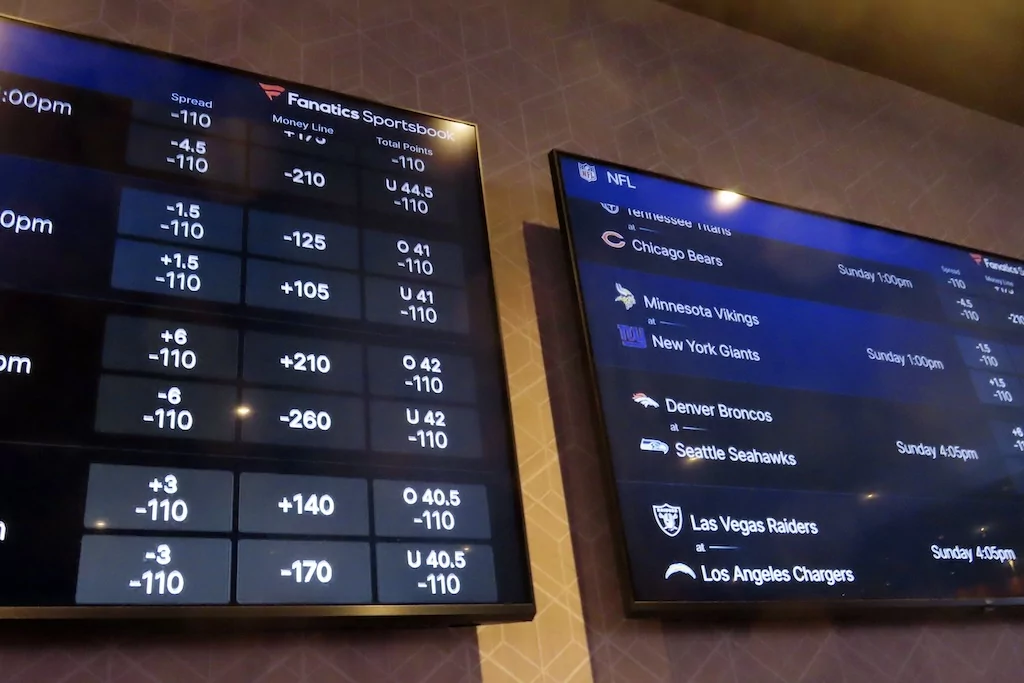
Sports betting has been legalized across the country in the years since the Supreme Court struck down a federal ban in 2018, but as more voters decide whether to legalize gambling, some lawmakers are attempting to add guardrails to the industry.
In Missouri, voters will take to the polls to decide whether to join the other 38 states, including the District of Columbia, that have legalized sports betting. With the rise of sports betting under the microscope, here is the state of play for sports betting in the country as voters in another state weigh in on the matter.
Sports betting is hitting record highs
Sports have dominated the national culture for centuries, and sports betting has become an increasingly larger part of the viewing experience for most sports since 2018.
Shortly after the 2018 Supreme Court decision, advertisements about sports betting offers began increasingly airing alongside sporting events, while sports networks FS1 and ESPN both launched their own sports betting-centric shows, Lock It In and Daily Wager, respectively. FS1’s show has since been canceled after being renamed Fox Bet Live, while ESPN’s show was renamed ESPN Bet Live after the launch of the ESPN Bet sportsbook last year, but it remains on the air.
In 2021, the NFL jumped on the sports betting trend by announcing Caesars Entertainment, DraftKings, and FanDuel as the league’s official sports betting partners. The NBA, NHL, and MLB later announced official partners as well.
Odds and lines for different games have also become more prominent in-game listings on sports websites and on broadcasts.
For the 2024 NFL season, the American Gaming Association estimated that adults will wager an estimated $35 billion with legal sportsbooks on the league throughout the season. The figure is an increase from the estimated $26.7 billion in wagers during the 2023 season, as Maine, North Carolina, and Vermont have all legalized sports betting since the beginning of the last season.

Some have concerns about effects of legalization
As more money is wagered and more states embrace sports betting, some politicians have expressed concerns over its legalization. Two Congressional Democrats are seeking to place limits on sports betting nationwide.
Sen. Richard Blumenthal (D-CT) and Rep. Paul Tonko (D-NY) introduced legislation earlier this month, the Supporting Affordability and Fairness with Every Bet Act, to regulate the industry.
The bill would create a general prohibition on sports betting unless states meet the regulations outlined by the legislation for advertising, affordability, and artificial intelligence for sportsbooks. The legislation would also ban proposition bets on college and amateur athletes, a regulation that has been adopted by various states recently after the NCAA expressed its concerns.
The two Democrats assert that the bill would combat sports betting addiction as a public health problem.
“Since their inception, sports and sporting events have been a chance for family, friends, and strangers to gather together in celebration of beloved teams and athletes in a great American pastime. But now, every single moment of every sporting event across the globe has become a betting opportunity. That’s resulted in a frightening rise in gambling disorder, which has, in turn, enacted a horrific toll on individuals, many of whom have lost their home, job, marriage, and their lives,” Tonko said in a statement.
“We have a duty to protect people and their families from suffering the tremendous harm related to gambling addiction. Our SAFE Bet Act gets the job done and gives sports back to the American people,” he added.
The AGA called the “heavy-handed” legislation a “slap in the face” to state laws on sports betting.
“Today’s regulated sports wagering operators are contributing billions in state taxes across the U.S., protecting consumers from dangerous neighborhood bookies and illegal offshore websites, and working diligently with over 5,000 state and tribal regulators and other stakeholders to ensure a commitment to responsibility and positive play,” the association said in a statement.
“Six years into legal sports betting, introducing heavy-handed federal prohibitions is a slap in the face to state legislatures and gaming regulators who have dedicated countless time and resources to developing thoughtful frameworks unique to their jurisdictions and have continued to iterate as their marketplaces evolve,” the statement continued.
The AGA, which includes several commercial and tribal sportsbook operators such as DraftKings, FanDuel, and MGM Resorts, has pushed its own initiative to combat sports gambling, called Have a Game Plan. The core of the initiative stresses that customers should set a budget, keep it social, know the odds, and play legally to prevent bets from spiraling into unhealthy territory.
If you or someone you know is struggling with a gambling addiction, resources are available nationwide, including the National Problem Gambling Helpline at 1-800-GAMBLER (1-800-426-2537).

Voters in the Show Me State get a say
As voters take to the polls to decide the fate of the White House and Congress, Missouri voters will decide whether online sports betting will be legalized for those 21 years old and older. Amendment 2 would also place a 10% wager tax on revenues, which would go to funding education after funding the Missouri Gaming Commission and Compulsive Gambling Prevention Fund.
The measure is supported by the four major sports teams in Missouri, including the Kansas City Chiefs, Kansas City Royals, St. Louis Cardinals, and St. Louis Blues, along with DraftKings and FanDuel sportsbooks. The main group supporting Amendment 2 is Winning for Missouri Education, which touts the alleged tax revenue upsides of the measure to legalize online sports betting.
“It is currently estimated that roughly $2 billion a year are placed in bets using offshore gaming websites, money that is currently not going back into our education system. By legalizing sports betting, we are ensuring tens of millions of dollars in education funding for our children and our schools, bringing that economic activity back to Missouri,” the group claimed.
Opponents of the amendment have contested the claims about funding for education, arguing the measure does not guarantee money to go toward education in the state. Missourians Against the Deceptive Online Gambling Amendment, the main group opposing Amendment 2, has claimed the measure would be the “wrong way” of bringing sports betting to the state.
“Amendment 2 is a bad deal for Missouri. This deceptive measure was written by and for the financial benefit of its out-of-state corporate sponsors and funders,” Brooke Foster, a spokeswoman for the group, said in a statement.
CLICK HERE TO READ MORE FROM THE WASHINGTON EXAMINER
In a poll from Emerson College/the Hill released earlier this month, 52% of voters support the measure, while 25.3% said they would oppose the amendment and 22.7% said they were unsure. The measure needs a simple majority to pass in November.
While ballot measures legalizing online sports betting have largely been successful, they are not always a sure thing. In California, a pair of state propositions seeking to legalize sports betting failed in 2022.






